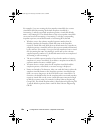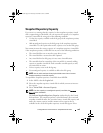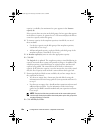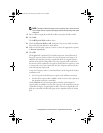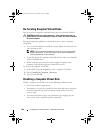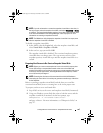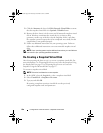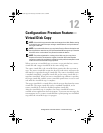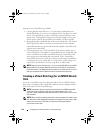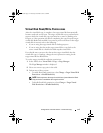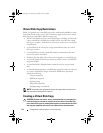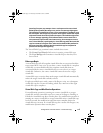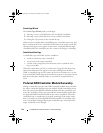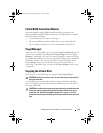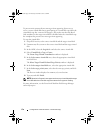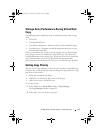
170 Configuration: Premium Feature—Virtual Disk Copy
Reasons to use virtual disk copy include:
• Copying data for improved access—As your storage requirements for a
virtual disk change, you can use a virtual disk copy to copy data to a virtual
disk in a disk group that uses drives with larger capacity within the same
storage array. Copying data for larger access capacity enables you to move
data to greater capacity physical disks (for example, 61 GB to 146 GB).
• Restoring snapshot virtual disk data to the source virtual disk—The Virtual
Disk Copy feature enables you first to restore the data from a snapshot
virtual disk and then to copy the data from the snapshot virtual disk to the
original source virtual disk.
• Creating a backup copy—The Virtual Disk Copy feature enables you to
create a backup of a virtual disk by copying data from one virtual disk (the
source virtual disk) to another virtual disk (the target virtual disk) in the
same storage array, minimizing the time that the source virtual disk is
unavailable to host write activity. You can then use the target virtual disk as
a backup for the source virtual disk, as a resource for system testing, or to
copy data to another device, such as a tape drive or other media.
NOTE: Recovering from a backup copy — You can use the Edit Host-to-Virtual Disk
Mappings feature to recover data from the backup virtual disk you created in the
previous procedure. The Mappings option enables you to unmap the source virtual
disk from its host and then to map the backup virtual disk to the same host.
Creating a Virtual Disk Copy for an MSCS Shared
Disk
To create a virtual disk copy for a Microsoft Cluster Server (MSCS) shared
disk, create a snapshot of the virtual disk, and then use the snapshot virtual
disk as the source for the virtual disk copy.
NOTE: An attempt to directly create a virtual disk copy for an MSCS shared disk,
rather than using a snapshot virtual disk, fails with the following error: The
operation cannot complete because the selected virtual disk is not a source virtual
disk candidate.
NOTE: When creating a snapshot virtual disk, map the snapshot virtual disk to only
one node in the cluster. Mapping the snapshot virtual disk to the host group or both
nodes in the cluster may cause data corruption by allowing both nodes to
concurrently access data.
book.book Page 170 Thursday, December 9, 2010 3:20 PM



